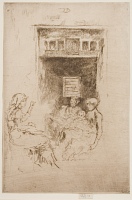Etchings Institutions search term: caxton club
Bead Stringers | ||
| Number: | 235 | |
| Date: | 1880 | |
| Medium: | etching and drypoint | |
| Size: | 229 x 154 mm | |
| Signed: | butterfly at left (8-final) | |
| Inscribed: | no | |
| Set/Publication: | 'Second Venice Set', 1886 | |
| No. of States: | 11 | |
| Known impressions: | 40 | |
| Catalogues: | K.198; M.195; W.164 | |
| Impressions taken from this plate (40) | ||
PUBLICATION
9: Dowdeswell to Whistler, invoice, 16 July 1887, GUW #00891.
EXHIBITIONS
10: London FAS 1883 (cat. no. 5). See REFERENCES: EXHIBITIONS.
11: New York 1883 (cat. no. 5). See REFERENCES: EXHIBITIONS.
12: 'The Whistler Exhibition,' New York Mail and Express, 24 October 1883 (GUL PC4/12).
 ,
,  or
or  ). 13 An impression from the collection of James Cox-Cox (ca 1849- d.1901) starred in the International Exhibition in Glasgow in 1901. 14
). 13 An impression from the collection of James Cox-Cox (ca 1849- d.1901) starred in the International Exhibition in Glasgow in 1901. 14
13: Chicago 1900 (cat. no. 144).
14: Glasgow 1901 (cat. no. 226).
15: New York 1904a (cat. no. 166); London Mem. 1905 (cat. no. 164).
SALES & COLLECTORS
 ). Way then sold it to Charles Lang Freer (1856-1919) in 1902. 16 In 1902, another - earlier - impression was sold by Whistler direct to Freer, for £8.8.0 (
). Way then sold it to Charles Lang Freer (1856-1919) in 1902. 16 In 1902, another - earlier - impression was sold by Whistler direct to Freer, for £8.8.0 ( ), and one was sold by the artist to the London print dealer Robert Dunthorne (b. ca 1851) for £12.12.0. 17 Either Whistler was a better salesman than the auction houses, or he kept the finer and rarer proofs for sale. Freer had already bought an impression of an earlier state from Frederick Keppel (1845-1912) of F. Keppel & Co. in 1887 (
), and one was sold by the artist to the London print dealer Robert Dunthorne (b. ca 1851) for £12.12.0. 17 Either Whistler was a better salesman than the auction houses, or he kept the finer and rarer proofs for sale. Freer had already bought an impression of an earlier state from Frederick Keppel (1845-1912) of F. Keppel & Co. in 1887 ( ) - being keen to have impressions of the several very different versions of the composition.
) - being keen to have impressions of the several very different versions of the composition.16: 23 June 1884, F.A.S. to Whistler, GUW #01175; Christie's, 27 November 1888 (lot 163); Sotheby's, 3 March 1892 (lot 259).
17: 24 December 1902, Merrill 1995 , p. 164 (Letter 67); GUW #13040.
 ) and Arthur Haythorne Studd (1863-1919) bequeathed an early and later impression to the Museum in 1929 (
) and Arthur Haythorne Studd (1863-1919) bequeathed an early and later impression to the Museum in 1929 ( ,
,  ). Thibaudeau sold a set for £52.10.0 through Gustave Lauser (b. ca 1841) to H. Wunderlich & Co. in May 1888, and it was bought by Isabella Stewart Gardner (1840-1924) in 1890 (
). Thibaudeau sold a set for £52.10.0 through Gustave Lauser (b. ca 1841) to H. Wunderlich & Co. in May 1888, and it was bought by Isabella Stewart Gardner (1840-1924) in 1890 ( ).
). ); Samuel Putnam Avery (1822-1904) (
); Samuel Putnam Avery (1822-1904) ( ); Charles Deering (1852-1927) (
); Charles Deering (1852-1927) ( ); Harry Brisbane Dick (1855-1916) (
); Harry Brisbane Dick (1855-1916) ( ); Walter Stanton Brewster (1872-1954) (
); Walter Stanton Brewster (1872-1954) ( ,
,  ); Harris G. Whittemore (d. ca 1937) and Emma Regina Martin (1921-2009) (
); Harris G. Whittemore (d. ca 1937) and Emma Regina Martin (1921-2009) ( ).
).
